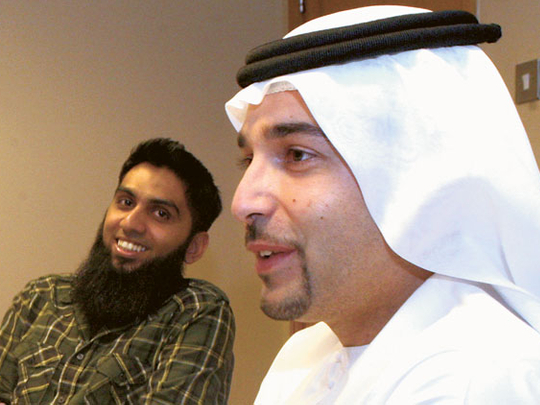
Everywhere you turn you see a person with a gadget in hand. It is most often a mobile phone, but increasingly you can spot someone tapping away at a tablet. From phones to music players, to laptops, we are being swamped by gadgets. But in the race to have the latest technology, the issue of online security seems to have taken a back seat. While most users are proud to show off their newest gadgets, are they aware that the shiny machines can also be used against them? In this month's live debate organised at the Gulf News head office, we asked readers whether people are truly aware of the threats they face. Here are excerpts of the discussion. To share your perspective, log on to our Facebook page ‘Gulf News Al Nisr Publishing UAE' or email us at readers@gulfnews.com
People are largely unaware of the threats they face because of the gadgetisation taking place.
Sherouk Zakaria
Yes. I am a gadget lover and I personally can't live without my mobile phone or laptops. But I have never thought about having viruses or any other danger on my laptop or my mobile phone.
Sarah Abbas
I'm the same. I can't live without my gadgets and my smartphone, I really can't emphasise this enough. I'm in love with my phone, it's always in my hand. At first, I was afraid of downloading applications and other content on my phone, but later I felt that as long as I download applications from official platforms like iTunes Apple or the BlackBerry App World I don't really have to worry. If I buy content from a third party website, that's when my concerns would be raised.
Osayed Rahman
Let me start with a question to both Sarah and Sherouk — you said you were not thinking about threats to your phones. Is it because you were not concerned about it, or were you not aware about it?
Sarah Abbas
A bit of both — I was slightly aware about it, but I wasn't really concerned.
Osayed Rahman
That is basically the main perspective for me in this debate — a user doesn't really understand the dangers that they might face because of viruses, identity thefts or credit card thefts. All these things can happen through your very own sweet mobile, which you love very much. It can turn against you. You need to be careful with the way the world is becoming gadgetised.
Dr Fadi Aloul
I teach computer security and I think when it comes to mobile security, most of the users today think that if they are paying thousands of dirhams for a mobile phone or a computer tablet, they assume that it is secure enough, because they are paying a hefty amount and the company will provide all the security features. However, strictly speaking, you can find out that there at many security holes that can infect your gadget, if a user is not careful or does not follow the basic rules. We teach all our students that there is no perfectly secure system and there is no perfectly secure phone. So, whatever you buy, even of you find a way to fix one problem, there will be another way to hack into the phone. It is a cat and mouse game really. Sooner or later, you will get infected. As we've mentioned earlier, people take security for granted. Also, keep in mind that the UAE in general is a very safe place and the citizens and residents are used to trusting each other and assume that things will be safe. You can leave your phone on the table in a coffee shop and go to the rest room and come back and the phone will still be there. So, people presume they will always be safe.
Security is the least important priority for users when buying a gadget.
Sherouk Zakaria
When I buy a phone, I look at the features. I don't really concentrate much on security, to be honest. But when it comes to downloading things, I try to avoid downloading from suspicious websites. Once I even tried to download an anti-virus on my phone but it didn't really work. I do download songs from websites, but I've never really faced problem.
Sarah Abbas
When I bought my phone, I didn't think I would face any security threats by downloading apps. But, I also only download from the App World. Other than that, I would never download anything onto my phone. Also, before downloading an application, I read the reviews to make sure it is safe.
Osayed Rahman
The thing is, it is not really the platform your mobile is based on that is the problem. It is not the operating system that makes it harmful, it is the way you use it. For example, if you are visiting a website and that website is downloading malicious files onto your cache memory, that will cause problems for you later on. Malware can be installed, so that whenever you enter your credit card information that information gets stolen. The way you use your phone will be decisive in determining whether your gadget gets infected. The most basic rule to follow is to use your common sense — if something looks suspicious, it is probably suspicious. There is a general rule that says that if you are not paying for something, you yourself are the product. That means that if I am going to a website and downloading free content off it, where is the advantage to the person running the website? They are probably taking my information and selling it to companies that may send me better pop up ads. Use your firewalls, use your proxies to protect yourself. Most importantly, update your password. Many people don't update their passwords at all — they use the same password for their entire lives. Update them; especially your bank information.
Dr Fadi Aloul
The way I look at it is that these smartphones are smart computers — you can access your emails, address book, calendar and every other thing. You can do pretty much anything that you would do on your personal computer. In time, I see the laptop and desktop market shrinking and the tablet and smartphone market increasing. So, whatever you are doing at the moment to protect your laptop sooner or later will be applied to your phone. A concept that is becoming more and more common nowadays is that mobility is equal to ‘losability' — the more mobile your device is, the easier it is to lose it. The phone that I am currently carrying has 64GB of memory. Imagine if you lose a phone with that much memory with all your personal data, pictures and information. So, you need to apply encryption. A very simple online search will tell you how to protect your data and your gadgets.
Osayed Rahman
If you visit a website that has too many pop up ads, that means it is suspicious — it is sending your information somewhere. I would suggest that if you want to buy anything online, have one website that you trust and keep purchasing from them. We don't normally read a website's or application's terms and conditions. Even with the changes that Google has made to its privacy policy recently has caused some debate. If I just log on to Google to do a simple online search, say about a restaurant in Lahore, Pakistan, that information will be stored and the next time I search for something similar, or even access my Gmail account, it will give me related suggestions.
Most companies are not bothered about educating users about online security.
Osayed Rahman
Yes, at some level it is intentional. Not many users bother reading terms and conditions. They just check the box before moving on. But again, companies like Google, that are trustworthy, don't get normally involved in unethical practices. You should have your benchmarks online — if you want to buy something, use a secure platform. Installing an anti-virus is a must — even if you don't know what the anti-virus is doing, at least it is doing something good! It is blocking out unwanted sources, software, spyware or pop up advertisements.
Sarah Abbas
Yes, I have to have anti-virus on my laptop all the time. I don't use my credit card online because I bought an online shopping card. But, I still make sure that a website is safe before I enter my card details.
Sherouk Zakaria
I am so protective of my laptop; I always do have anti-virus installed. There is more awareness about your laptop or your email being hacked, but not of your phone being hacked. And this discussion has really made me realise that our phones today aren't very different from our laptops. To me my laptop is sacred, it is protected by anti-virus software all the time, but never my phone.
Osayed Rahman
The safest you can be is to use a prepaid credit card. Put in money for the item you want and you'll be safe. Even if you have more than one credit card, use the one which has the lowest limit online. So, even in the worst case that your card information is stolen, you cushion the blow. There are also things like key loggers which store everything you type, which means that all your information can be stolen. So, it would be better to use a virtual, on screen keyboard to enter your confidential information, if you have any doubts that your system has a virus of some sort.
Dr Fadi Aloul
But nowadays, there is a new way in which the virus takes screen shots every time you click, so they can again get all the information. There is also a wireless keylogger, which is attached to your computer and immediately transfers all the information to a person who may be sitting nearby. So, you need to stay up to date! If you are buying from trusted websites that have security checks, it is fine. However, there are other companies based in foreign countries. There website portals may be secure but the channel is not encrypted. So, anybody can be viewing the data while the information goes from your computer to the website. There's are various risks for you being attacked and if you do get attacked, one can never say that it is the user's fault. I can't tell a person who was hacked that it is your fault, you haven't been reading enough. There are several key players that need to be aware. Users, definitely, have to be aware. Then comes th government. The government here has a Computer Emergency Response Team (CERT). They are in most countries, too, like Saudi Arabia or other Gulf countries and even European countries. Their goal is to spread awareness on how to use your phone, laptop and PC safely. They have been doing that very well, as they have come up with a little Emirati boy character called Salem, who is often featured in their advertisments, to spread awareness. The third angle is from the vendors — when they are selling the phone, they should provide leaflets or brochures on how to use it safely. It is a multi-player game and you can't just blame it on any one person. Everyone has to collaborate.
Osayed Rahman
There was a Symantec report that came out in 2008 that said that there is more malicious code being written across the world than actual, useable code. There is a big chance of you to get hacked, of your information being stolen. It is not something you can ignore any longer. You need to come to terms with it. Also, I'd like to add that people who are technologically aware - and every family has at least one person who has a good idea of technology — should also take responsibility of what is going on. I could say that it is not my problem and it will only infect someone your parent's or friend's computer, but it will affect you ultimately. So, people need to take responsibility for those who don't know much — protect your parents and your friends.











